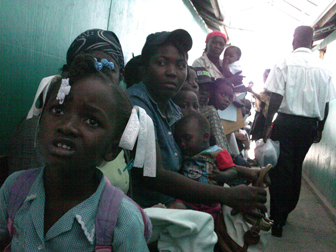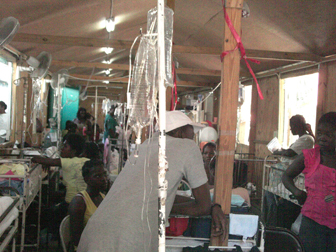Treating Patients Without Tools: Haiti's Diabetes Crisis Day 4
Our final full day in Haiti is today. I am both ready to go home – can't wait to feel clean and not put on Deet-- and sad to leave a place that quickly grows on you, gets under your skin and amazes you continuously.
We went to the mountains with two board members of FHADIMAC, and from a high perch, the city of Port-au-Prince below looked like paradise. But as we descended the mountain, winding out of our way and close to the edge to avoid debris, reality came back to us.
The streets got progressively more crowded: a woman walked by with a basket filled with live chickens on her head; men were milling around and the rubble and debris appeared everywhere. We went to a grocery store - I got cheese and was in heaven, and to a Middle Eastern restaurant for hummus and baba ganoush. 
We sat behind a gate in an idyllic garden setting, and we felt almost transported to another place and another time. We discussed the low literacy rate in Haiti -- about 70% of people cannot read and write according to our luncheon partners. Every opportunity Haitians get, they talk about NGOs or the ever-present international non-profits. They share both the negative and the positive. The negatives: the non-profits don't work together and not much with Haitians themselves; they take a lot of resources, distort prices and leave abruptly.
And what is there to show for their work? Well, in my eyes, it looks like close to nothing. Haitians also talk a great deal about the upcoming elections. The likely winner is not a politician. And what they ache for is an effective, proactive government that can get hold of the donated monies and use them to fix Haiti. But no matter what side they are on, all agree it will take decades to get back to the pre-earthquake Haiti -- if ever. And no matter what the conversation, it always ends up with a discussion of where they were, what they were doing, where their family and friends were and who they lost at the time of the earthquake.
As usual, the afternoon was dedicated to teaching. Today's meeting with all of the incredible doctors was a great exchange.  I discussed the long term management of diabetes, diabetes in pregnancy and how to prevent diabetes complications. I presented the International Diabetes Federation Standards of Care for Low Resource Counties. But my audience knew infinitely more about this than I did. I was the student; they were the teachers. They were gracious, excited to debate and thrilled to tell me of their experiences. The doctor for the general hospital was there, she gave me follow up on the two-month-old baby with hyperglycemia who we had seen a few days before. He is still hyperglycemic, not thriving and still on IV insulin. The insulin is delivered in pushes at intervals rather than as a continuous drip like we do. There are not enough skilled nurses, IV pumps or experience to think about giving this infant a continuous drip. We discussed some options, trying to figure out how he can be converted to shots. He likely has a rare genetic syndrome, and likely will not make it. But this incredible pediatrician is by no means ready to give up.
I discussed the long term management of diabetes, diabetes in pregnancy and how to prevent diabetes complications. I presented the International Diabetes Federation Standards of Care for Low Resource Counties. But my audience knew infinitely more about this than I did. I was the student; they were the teachers. They were gracious, excited to debate and thrilled to tell me of their experiences. The doctor for the general hospital was there, she gave me follow up on the two-month-old baby with hyperglycemia who we had seen a few days before. He is still hyperglycemic, not thriving and still on IV insulin. The insulin is delivered in pushes at intervals rather than as a continuous drip like we do. There are not enough skilled nurses, IV pumps or experience to think about giving this infant a continuous drip. We discussed some options, trying to figure out how he can be converted to shots. He likely has a rare genetic syndrome, and likely will not make it. But this incredible pediatrician is by no means ready to give up.
I sat with four eighty-year-old emeritus physicians - an endocrinologist, a cardiologist, a surgeon and an internist. They were arguing with me about articles that were just released in medical journals. They told me how they manage renal failure in diabetes. I was amazed at their clarity of thought, their commitment to their patients and students (everyone evidently with a medical degree from Haiti in the last 50 years is their student). I asked them why they don't leave, and each simply answered this is their home. This - with arms outstretched - is their family.
Francine Kaufman, M.D., is sending updates from her Blackberry during her visit to Haiti with a relief mission. Here are links to her other updates:
